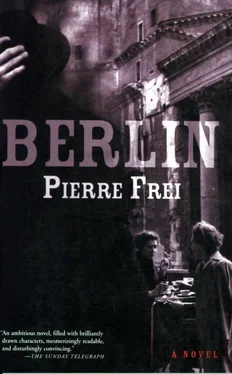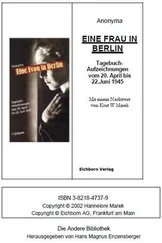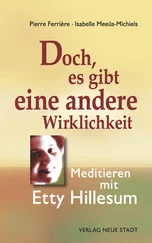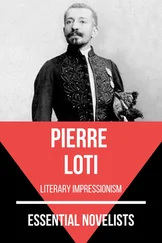'Father's done nothing wrong. They'll soon set him free,' Hans-Georg soothed her.
A military vehicle roared into the yard, followed by two motorbikes with sidecars. Six SS men in long rubber coats pointed their sub-machine guns at everyone present.
An SS lieutenant got out of the vehicle. 'Sturmfiihrer Keil, Special Commando Unit. 'He gave Hans-Georg a cold look. 'Who are you? Your papers!' he barked.
'Five minutes ago I was Cavalry Captain Baron von Aichborn. Now I'm just a farmer. The Russians have been here. The war's over — for you too. Herr Keil.'
We decide when the war is over. Hang the traitor,' ordered the Sturmfuhrer.
Two men seized Hans-Georg. A third took a piece of cord out of his coat pocket and tied his hands behind his back. The driver brought a milking stool and calf's halter out of the cowshed. They dragged Hans-Georg, who was resisting in vain, under the light fitting outside the coach house. It all seemed horribly routine.
'Please wait,' Detta heard her voice as if from very far away. 'I'II get his papers.'
'I'll give you one minute,' the SS executioner called after her. She crossed the yard like a sleepwalker.
At the gun-room window she came to herself again. She saw them lift Hans-Georg on the stool and put the noose around his neck. One of the SS men was raising his leg to kick the stool away. She felt the smooth shaft of the rifle against her cheek, she had her brother's forehead in the cross-hairs of the telescopic sight. 'Breathe out, pull the trigger slowly, rather as if you were squeezing a sponge, or you'll swerve to one side,' she heard him say.
I love you, she thought. The sound of the shot drowned out her stifled cry.
A Russian airman, flying low, had put the SS unit to flight. Silence lay over Aichborn. The spring sun warmed the silent people. The Polish workers took off their caps and crossed themselves. Women wept as they looked at the body.
They carried him into the house and laid him on the big ash table where game was skinned and cut up in the hunting season. Detta washed his naked body with slow, caressing movements. Lina helped her to dress the dead man in his uniform. They had to cut his riding boots open at the back to get them on. Then they laid him on a bed of ivy in the Aichborn chapel. Bensing would have made the coffin by evening.
Torchlight illuminated the graves behind the chapel where the Aichborns had been laid to rest for the last four hundred years, except for those who had fallen in battle far away. The night was cold and starlit. Pastor Wunsig spoke of the peace in the land that Detta's brother would not see now, and the eternal peace that he had found. Detta stood heavily veiled by the graveside, as tradition demanded. In the kitchen she took her veil off. She offered the pastor grog to warm him up, and told an amusing story about herself and Hans-Georg as children. Aichborn women never showed their feelings, and Detta had no feelings any more. Everything inside her was empty.
She registered what went on around her in the next few hours: the arrival of the red hordes under a fat little captain who watched what his soldiers were doing with approval and had the youngest girls brought to him: the screams of the raped women and beaten men: the senseless slaughter of horses and cattle. She registered it but did not really take it in. She and Lina made huge pans of soup in the kitchen for the victors, and that preserved her from the worst for the moment, but she cherished no illusions about the future.
As she was carrying a soup pan out to the men round their fire, Jurek grabbed her. He had been drinking with the soldiers. 'Come here, German whore!' he bellowed, dragging Detta away from the fire into the dark. His breath smelled of vodka. He let go of her behind the stables. 'You scream so they think I kill you,' he whispered.
Detta screamed until her throat hurt.
'I saddled Loschek. Get away quick, right?'
He had tied a blanket on the old horse's back with a girth. He helped her up. The night was cold and starry once again. She orientated herself by the Great Bear. Berlin, here I come, she thought. I'm repeating myself, she realized bitterly.
The Berlin city commandant looked up from his desk. 'Good morning, Curt.'
'Good morning, sir.' Curtis S. Chalford indicated his companion. 'Sir, this is Henriette von Aichborn.'
The general shook hands with Detta. 'Glad to meet you, Miss von Aichborn. I am Henry Abbot. We're all here to find out whether you'd like to become my German liaison.' Abbot was a lean, grey-haired man with a weathered face. He had the clipped, dry accent typical of New England aristocracy. Detta liked him at once, and the feeling seemed to be reciprocated.
'That's entirely up to you, General Abbot. But why don't we give it a try?' she said.
A trial period, excellent,' Chalford agreed. Detta had gone to see him at the German-American Employment office, and he had suggested her for the post — the applicant spoke fluent English, was a real lady, and had that certain something that you couldn't learn but were born with.
Detta would have taken almost any job. She wanted just one thing — to immerse herself in work and to forget it all; her wild flight from Aichborn, first on horseback and then on foot, after hungry, homeless people had killed the old nag. She had hidden from the marauding liberators in the undergrowth or in barns by day, taking remote paths through the woods and fields by night, then spent the following weeks with the Glasers in Mahlow on the outskirts of Berlin — the fact that a woman Red Army major was billeted on them meant that they escaped the worst. News came from the faithful Bensing, by roundabout ways, that her mother had been released, but her father was in the NKVD camp at Buchenwald.
After the Western Allies had entered the capital, Detta ventured to the Steubenplatz, which was in the British sector. Her apartment was occupied. A family who had survived the trek from East Prussia had been quartered there. She was able to retrieve a few things from her wardrobe, though where she would take them she didn't know.
At the Housing Department, where she stood in line for hours on end, someone spoke to her. 'It's Fraulein von Aichborn, isn't it?' The woman wore a once elegant, foal-skin coat and a headscarf. 'Elisabeth Mohr. You visited us once at Horn's fashion house on the Kurfdrstendamm, with Fraulein Goldberg. It must have been in about 1935.'
'Frau Mohr, yes, I remember.'
Frau Mohr had to give up a room in her apartment. 'I'd rather find a tenant for myself than have someone billeted on me.' So Detta and her few things found a place to live in Waltraudstrasse on the Fischtal park, and had the benefit of Frau Mohr's good advice, too. 'If you speak any English, you could try getting work with the Yanks. They pay in Allimarks, but most important of all, they give you something to eat.'
And now she was in the process of taking up one of the most important posts open to a German at this time: advising the US city commandant and liaising between him and the people of Berlin. But she felt no pleasure or satisfaction. She felt empty and alone.
The arrival of her mother was an unexpected gleam of light. The Baroness had made her way to Berlin on foot and on the roofs of overcrowded freight trains. Fanselow and his Red friends were ravaging Aichborn. They had looted the schloss and expropriated the land.
The Baroness smiled painfully. 'Bensing had to go through a session of self-criticism as a "minion of the Junkers". He insisted on staying. Someone must be at Aichborn when Father comes home, he says. Oh, Detta, I have so little hope. I hear that conditions in the camp at Buchenwald are even worse under our new masters than before.'
From then on mother and daughter shared the same bed. Frau von Aichborn was not a refugee and had no right to accommodation in Berlin. She lived like a shadow, spending her days reading or going for long walks in the Fischtal. A pretty park,' she said. 'Did you know that the name Fischtal has nothing to do with fish? The farmers of Zehlendorf used to call the pastures there the "Viehstall", the "cowshed". A man out walking told me that.'
Читать дальше












